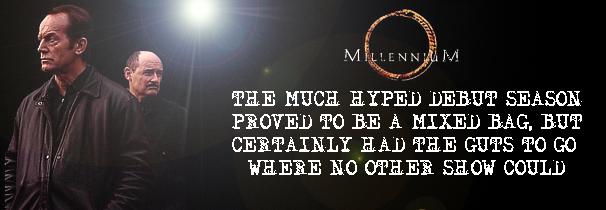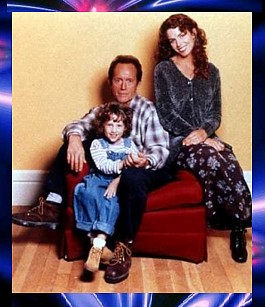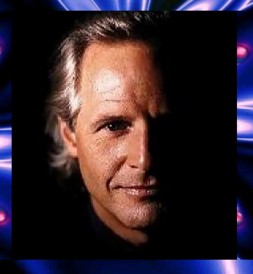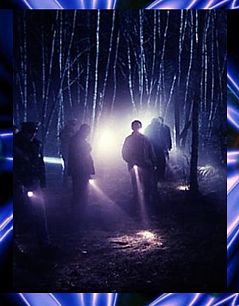

 When Chris Carter writer-producer created The X-Files,
he set himself up as a major figure in the field of TV. By the time The X-Files
went into it's fourth season in '96, it wasn't the only of his creations hitting
the Fox air waves.
When Chris Carter writer-producer created The X-Files,
he set himself up as a major figure in the field of TV. By the time The X-Files
went into it's fourth season in '96, it wasn't the only of his creations hitting
the Fox air waves.
Millennium told the ongoing story of Frank Black (Lance Henriksen), a brilliant FBI agent with slight psychic abilities who quits the grim world of death and crime to spend time with his wife Catherine (Megan Gallagher) and young daughter Jordan (Brittany Tiplady). The family move into a house in suburban Seattle for a normal life, but Black's talent and power means he continues to become involved in criminal investigations, often involving serial killers. Much of the time he works with local PD, including Detective Geibelhouse (Stephen J. Lang) and old friend Lt. Bob Bletcher (Bill Smitrovich). However, Frank frequently collaborates with the Millennium Group, a top secret consulting group made up former cops and federal agents. The Group sees Frank as a potential member, and think he'd be a useful alley as the new century approachs. Believing that the next millennium will bring about the final war between good and evil, the Group need those will can help them prevent the end of the world. Frank's regular connection to the Group comes in the form of Peter Watts (Terry O'Quinn). However, the Groupís motives and schemes were more than a little vague early on.
 Because of the dark trappings and stories, he never
thought of the series as truly bleak. "People
have said to me that they think Millennium is the darkest show on
television, I really don't think that it is," Carter
explained. " I defend that regularly because I
think that it actually has a very, very bright centre, a very bright hero. I
think his dark is the world he lives in, works in, he is a person who has a
tremendous amount of optimism and hope and I think if you look at what this man
does, what his motivations are, they're very bright and noble and very
interesting to me in that way. A yellow house to me represents happiness and I
wanted that to be a very happy house, a sanctuary, a place where Frank could
keep his family safe. He was literally by painting the house yellow, painting
away the darkness which I think is really
what Frank's goal is, is to keep his family in the light away from the
darkness."
Because of the dark trappings and stories, he never
thought of the series as truly bleak. "People
have said to me that they think Millennium is the darkest show on
television, I really don't think that it is," Carter
explained. " I defend that regularly because I
think that it actually has a very, very bright centre, a very bright hero. I
think his dark is the world he lives in, works in, he is a person who has a
tremendous amount of optimism and hope and I think if you look at what this man
does, what his motivations are, they're very bright and noble and very
interesting to me in that way. A yellow house to me represents happiness and I
wanted that to be a very happy house, a sanctuary, a place where Frank could
keep his family safe. He was literally by painting the house yellow, painting
away the darkness which I think is really
what Frank's goal is, is to keep his family in the light away from the
darkness."
David Nutter, an X-Files veteran, directed a number of first season Millennium episodes (including the compelling pilot), and acted as co-producer. The approach to evil the show took appealed to the director, who also helmed the box office dud Disturbing Behavior in 1998. "With Millennium, we're not going for the paranormal so much as the hell right outside the window, which is more frightening and much more real. The world that Frank travels in as he's hunting down these terrorists and killers and people of that sort is a world that's very monochromatic and post-apocalyptic; in many ways, it's hell on Earth, and Frank Black is that candle in the dark. He's the one with his finger in the dike, so to speak, trying to keep the bad man away."
Gallagher, who previously had stints on such acclaimed shows as Hill Street Blues and The Larry Sanders Show, found the concept of the show too good to pass up. Despite the scares and shocks, the more seemingly mundane elements of the series was the selling point. "There are quieter moment," she explained. "Many of them. That's one of the things I like most about the show. The yellow house the Blacks call home is a very, very important place, and we'll see a lot of them in it. You'll see me functioning as wife and mother, and you'll see Frank as husband and father. It's extremely important that you see us do more than just work, that you see us be a family, and Chris realizes that."
Gallagher and Henriksen were the sole actors billed in the opening titles sequence, much like Gillian Anderson and David Duchovny on a certain other series. However, the characters of Catherine and Frank didn't have a professional relationship. "I don't think that I could call them a good team, in the sense they are definitely not Mulder and Scully from The X-Files," Gallagher continued. "They're not working partners. Emotionally, though, they're a very good couple. She's the only one he really, really trusts. She understands that he basically lives in this dark place. She understands it more than anyone else, but that doesn't mean she completely understands it. In many ways, Frank is a different human being who can't be completely understood by anyone, even his wife."
Henriksen is a veteran actor of many movies, with such notable credits as Close Encounters Of The Third Kind, Dog Day Afternoon, The Terminator, Hard Target, Aliens, Alien 3, and recently Scream 3. Despite making guest appearances on TV shows over the years, Millennium offered the actor his first series lead. The actor, who received three Golden Globe nominations for his work, found his own key to getting a lock on Frank Black. "Experience," he stated simply. " I had to have experience. We took a lot of time over the pilot, and it was very restrained, very well thought-out and very focused. And at the end of the shoot, I literally looked at Chris Carter and said, because of the way I was feeling, 'What was my contribution to this thing?' Because I didn't know--I had no idea at that moment what my contribution had been, because the whole thing was so restrained."
 The actor found Frank's family-man status easier to
relate to, but given the subject matter of the pilot, this actually made things
more uncomfortable. "It was very painful to
do," he admitted. "a
very difficult piece of material. Don't get me wrong--this is not a negative at
all. I loved it, but I had gone through something, and at the end of it I was
sitting there kind of dazed, saying, 'What did I do?'"
The actor found Frank's family-man status easier to
relate to, but given the subject matter of the pilot, this actually made things
more uncomfortable. "It was very painful to
do," he admitted. "a
very difficult piece of material. Don't get me wrong--this is not a negative at
all. I loved it, but I had gone through something, and at the end of it I was
sitting there kind of dazed, saying, 'What did I do?'"
Henriksen looked back on the first season, and was overall satisfied with the results. "I liked 'The Thin White Line' and 'Wild And Innocent,'" he said. "There were certain shows where everything worked--the director and the script were good, and I thought my work was all right."
Like any season, Millennium varied in the quality of it's shows, and it was a new show still trying to find it's feet. "It's a gamble," Henriksen admits. "because you start a show and you wonder, 'Are we as a group gonna find the metaphor somewhere along the line? Are we gonna make it work?' Because every time you go out, in order for it to be really good, you have to find something on screen, while it's happening."
The debut season of Millennium proved to be a mixed bag. The latter half of the season was much better than the former, which wallowed too much in "serial killer of the week" format. The pilot episode was great show, and set a powerful tone. However, what was to follow for the next, say ten weeks, was the same sort of thing, and it became stale. The episodes themselves weren't bad, but it wasn't exactly invigorating watching Frank, Peter and Bletch track deranged killers week in and week out. I nearly gave up and stopped watching. Luckily I didn't.
The second half began to take more risks and actually explore the whole concept of evil. One of the true standout episodes was 'Lamentation', a startling entry in which the extremely likeable character of Bletcher was violently killed by the mysterious, demonic Lucy Butler, a character who would appear several times throughout the series. 'Force Majeure' was an especially creative and thrilling episode, and featured a guest appearance by Brad Dourif, who gave a superb performance on The X-Files episode 'Beyond The Sea'. Another highlight was 'Maranatha', which dealt with the Russian anti-Christ. The season ended with Catherine being kidnapped by the "Polaroid Man", an unseen character who had been sending Frank photographs of his family for months. With Frank desperate to save his wife, season 1 concluded with a cliffhanger. And it wouldn't be long before Millennium would become (at least for a little while), the most fascinating show on television.
